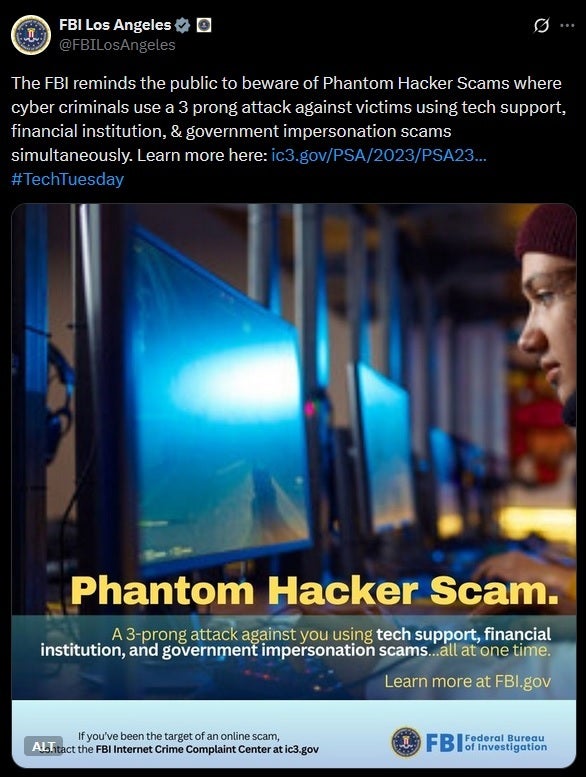FBI tells you how to protect yourself from this scam that "ends with you losing your savings"
The FBI is warning consumers about The Phantom Hacker Scam that goes after their financial accounts.

The FBI has issued the latest in a series of serious warnings to smartphone users. In the past, the agency has warned smartphone owners about dangerous emails designed to get them to reveal the passwords they use to safeguard their financial apps and protect their banking, crypto, and securities accounts. Now, the FBI is telling connected consumers to worry once again about "The Phantom Hacker Scam," a well-designed scam created to wipe out many smartphone users.
"It starts with an unsolicited message, and it ends with you losing your savings," the FBI says. The warning heats up as the FBI says, "The threat is growing fast." The scam starts with communication from the victim's bank via text or email telling them in an urgent manner that they need to call tech support for assistance. When they call the phone number listed in the message, they're told by an imposter pretending to work at the bank that their funds are at immediate risk from a hacker who broke into one of their devices.


This is all bogus, of course. The hacker is as fake as the bank employee who tell the victim that he will help him over the phone go through the process of securing his device. To do this, the fake bank employee will pretend to transfer the victim to tech support, and another one of the scammers will pick up the phone to say that he is from the bank's tech support unit. He goes on to tell the victim that a special app needs to be installed on his phone so the bank can check out the level of security on the device.
Will you heed the FBI's warning?
Yes. They have some good tips on how not to be ripped off.
35%
No. This scam will not happen to me.
5%
The FBI tips are what I would have done anyway.
60%
If this ever happens to you and you get to this point, do not allow the app that the bogus bank employees are pushing on you to be installed on your phone. If you do, they will ask you to check your bank accounts for fraudulent transactions. They will do this by asking you to open your banking, securities, or crypto apps. They might ask you to show them the most recent statements from these accounts which can be opened via an app or a website using your phone's mobile browser.
The thing is, thanks to the app they asked you to install, whatever you see on your phone, they can see. That's why you should not agree to have the app they suggest you add to your device, installed on your phone, tablet, or any other connected device you use.

FBI warns the public about the Phantom Hacker Scam. | Image credit-FBI
If you don't heed this warning, the scammers will now know exactly how much is in your account and where that cash is. They will then tell you that they can help you move your money to a safe account, which they promise will keep your money away from the made-up hacker they might have told you earlier was a threat to the safety of your funds. The safe account is actually their own bank account or crypto wallet. The transfer is made, and your money is gone forever.
To prevent this from happening to you, do not respond to any text, email, or pop-up that is trying to get you to respond to the missive through your fear. These scammers know that if they make you concerned about a made-up hacker, you are going to respond a specific way, and that way is to follow what they tell you to do.
The FBI is calling this the "Phantom Hacker Attack" since the attackers make up the story that the victim's bank account is being threatened by a hacker that doesn't exist. Again, that creates fear and the fear can be used to motivate the victim to install a tracking app.
Back in 2023, when this scam was originally the subject of warnings by the FBI, the agency suggested that consumers take the following steps to prevent themselves from becoming another victim:
- Do not click on unsolicited pop-ups, links sent via text messages, or email links or attachments.
- Do not contact the telephone number provided in a pop-up, text, or email.
- Do not download software at the request of an unknown individual who contacted you.
- Do not allow an unknown individual who contacted you to have control of your computer.
- The US Government will never request you send money via wire transfer to foreign accounts, cryptocurrency, or gift/prepaid cards.
Follow us on Google News












Things that are NOT allowed:
To help keep our community safe and free from spam, we apply temporary limits to newly created accounts: